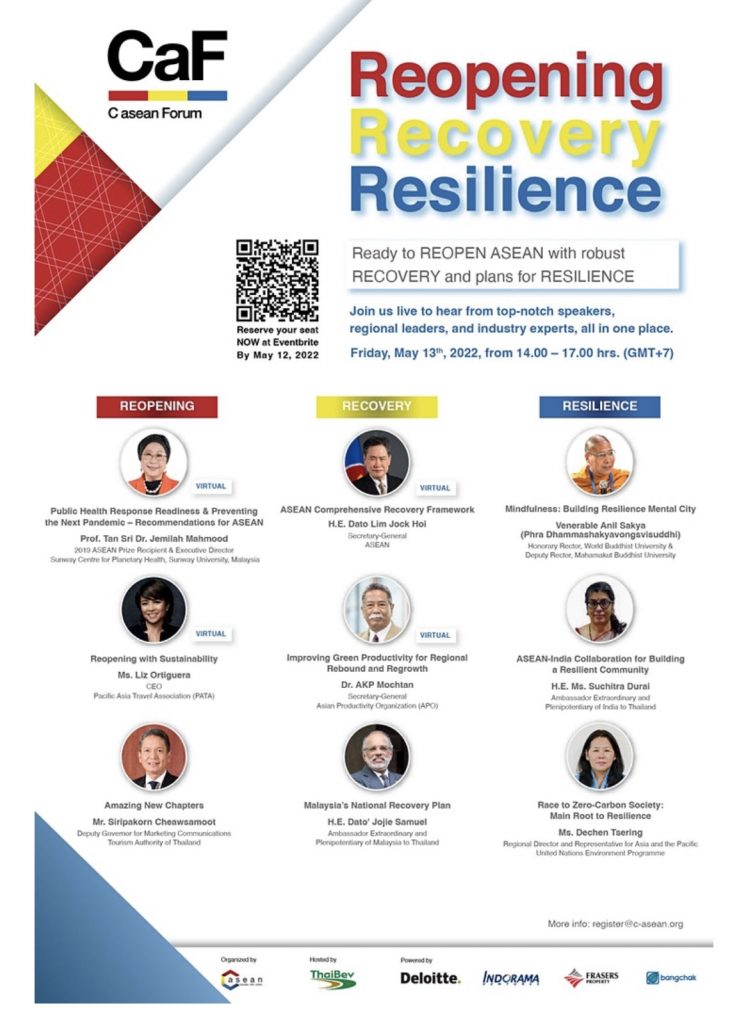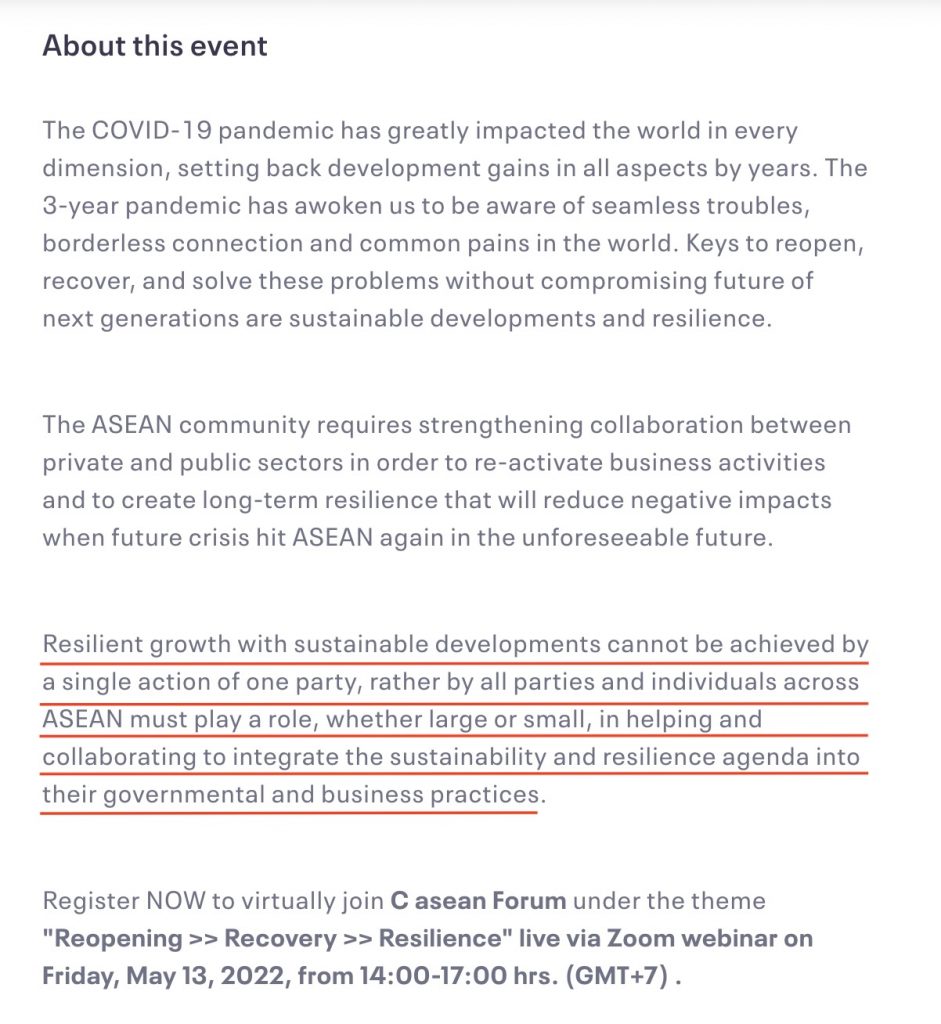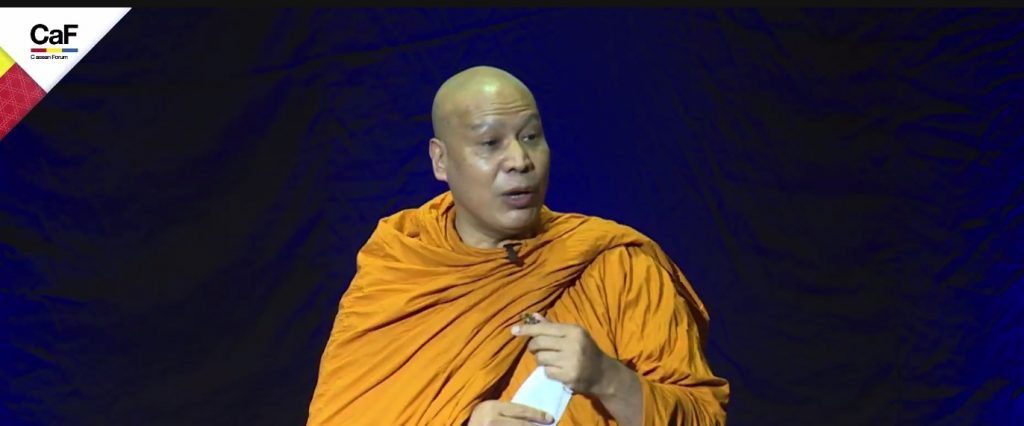
17 May, 2022
A Prominent Thai Buddhist monk’s alternative path to Reopening, Recovery, Resilience
Bangkok – One of Thailand’s prominent Buddhist monks has flipped all the conventional textbook theories of crisis management with a heart-warming personal perspective on the prevailing “Reopening, Recovery, Resilience” agenda. The simple but profound wisdom shared by the Venerable Phra Anil Sakya, the Rector of Mahamakut Buddhist University, won him a round of polite applause from his erudite audience of CEOs, diplomats, government officials and technocrats. They came away inspired but whether that translates into anything concrete remains to be seen.
Had I not noticed the Venerable Monk on the list of speakers assigned to talk on “Mindfulness: Building Resilience Mental City”, I would have dismissed this as another of those tediously boring forums which I have long ceased attending. Having covered multiple geopolitical, economic, environmental and health crises since the 1980s, I have tired of hearing the same rehashed crisis-management mantras. But the event flyer made some lofty promises on what it hoped to deliver and I knew Phra Anil would not fail.


In big demand on the lecture circuit, the highly-respected Phra Anil commands a good stage presence, speaks with flair and humour, and spreads enlightenment without sermonising. I have known him for years and am proud to be the only travel journalist to have covered many of his visionary lectures and activities. See more details of my coverage at the end of this article.
Venerable Phra Anil was the 7th of nine speakers on the list, following on from a lineup of academics, diplomats and CEOs. While the others delivered their pre-packaged, party-line presentations, Phra Anil’s perspective, rooted in Buddhist wisdom, was simply that global crises and personal crises have much in common. The world has just been through nearly three years of death, socio-economic damage and devastation, the Venerable Monk said. How he dealt with his own personal life crisis may offer some guidance on how to reopen and recover with resilience.

The lecture deserves to be watched in full, if a recording is available from the organisers. I can only attempt a summary.
Phra Anil was deeply proud and honoured to become the first Thai Buddhist monk to win a Royally-conferred scholarship at Christ’s College, Cambridge university. Just two months into his course, he bungled his first writing project, was declared incompetent by the professor, and effectively told to go back home. The shock and disappointment sent him into a depression for three days. With his dreams all but collapsed, he became suicidal and pondered disrobing. But the thought of staying on in the UK and washing dishes in a restaurant did not appeal to him either. But how could he go back and face the shame? “What would I tell the King? The Supreme Patriarch? When I left Thailand I was in the news that I was the first monk to be accepted at Cambridge university. All were happy with me. Now how will I go back? How can I show my face to all?”
After three days of “mental pitch darkness”, the first rays of light shone through. “Then I saw my robe and said to myself, I am disciple of the Buddha, have Royal Blood, why am I feeling like a loser? My life is not just about Cambridge. To be a true man is to be resilient. As soon as I reminded myself of the Buddha’s words, I saw some light. And then I began to meditate with mindfulness. Meditating does not mean just sitting and keeping calm but investigating and reopening what happened. I slowly began to recover. I rewind and replay (sic) the words of my supervisor, slowly going over every word with mindfulness. I began to investigate myself, and then I became resilient.”
He then gave his work another try, which proved to be successful.
He said, “As a monk, I always counselled others, but now I had to face my own life crisis.” His solution: “First Study Yourself.” All humans are affected by health problems, and all face the inevitability of death. These should be seen as lessons. Even trees get destroyed by the forces of Nature, but if they are strong, they bounce back and grow again. “If you want to be a true human and bounce back, develop mindfulness.”
Like all stories and parables, the monk’s narrative was embedded with lessons. Three takeaways are clear:
1) His acceptance of criticism. The Cambridge professor did not mince words; Phra Anil’s work had not met the university’s standards. The monk first had to accept the honest criticism. CEOs, diplomats, technocrats and government officials are not known for this.
2) In pondering a way forward, he looked inwards, well aware that the solution lay within.
2) He solved the problem by addressing the root cause: The poor quality of his own work.
The combined result was “Mental City” — tapping the power of mindfulness to develop “inner resilience”, not finding fault with others.
After listening to the rest of the speakers blow their respective trumpets, it became clear that the countries, institutions and organisations they represented also need to develop mental cities and inner resilience by looking within themselves.
Here are some potential future deliverables, based on the Venerable Phra Anil’s guidance:
(+) ASEAN: 2022 is the 55th year of the founding of the ASEAN, and 30 years since the grand Visit ASEAN Year celebrations. Has it achieved its goals and fulfilled the lofty objectives of the various communiques, resolutions, declarations and blueprints? Has it looked inwards and first studied itself to explore its own weaknesses? To what extent can diplomatic niceties continue to be deployed to camouflage numerous internal divisions?
(+) India: Once a proudly secular democracy, and the birthplace of Mahatma Gandhi, India is now being slowly converted by the Modi regime into a hardcore Hindutva theocracy with steep declines in fundamental freedoms, judicial independence, communal harmony and human rights. A top-down, might-is-right agenda has deeply polarised the country. As the Lord Buddha himself attained enlightenment in Bodhgaya, has India looked inwards and first studied itself to see whether its future trajectory is in line with the Buddha’s teachings?
(+) Thailand: In addition to being a Buddhist-majority country, Thailand became a constitutional monarchy in 1932, exactly 90 years ago. For 70 years it was blessed with the benevolent reign of King Rama IX the Great, known as the Development King. Has it looked inwards and first studied itself to see whether the late king’s advice and guidance, especially on the Sufficiency Economy, have ever been seriously implemented?
(+) PATA: Once the pre-eminent Travel & Tourism institution in the Asia-Pacific, PATA is now a shadow of its former self. Has it looked inwards and first studied itself to ask what went wrong, and why? How can it dispense advice on crisis management and recovery and resilience to others when it failed to fix its own internal problems?
(+) Thai Travel & Tourism: 2022 has been declared another Visit Thailand Year, a sequel to the highly successful Visit Thailand Year 1987, marked exactly 35 years ago. Has it used this anniversary to look inwards and first studied itself to explore the multiple challenges that have emerged since 1987, when the kingdom received a meager 3.84 million tourists, a figure which it was chalking up every month by 2019?
(+) Travel & Tourism at large: As an industry, has it ever looked inwards and first studied itself to objectively weigh its decades of outstanding economic successes against its disastrous environmental, socio-cultural failures?
As these countries, institutions and industries pursue the Golden Triangle path of Resilience, Recovery and Reopening, do they need to develop mindfulness, meditate and look inwards at their own mistakes? The current obsession with “sustainability” does not even come close to addressing the monumental challenges the Asia-Pacific region and Travel & Tourism at large face in a highly unstable, politicised, divided global atmosphere.
Inviting Venerable Phra Anil to speak was itself a game-changer at such an event. The Covid-19 crisis has been dominated by talk about creating a “New Normal”, converting a Crisis Into An Opportunity and Building Back Better. Travel & Tourism forums, however, are largely still pandering to the usual gang of “visionaries, futurists and thought-leaders” and dangerously close to going back to the Old Abnormal.
Finally, they heard one visionary but grassroots perspective which outclassed all the others. Will anyone hear and heed?






Liked this article? Share it!